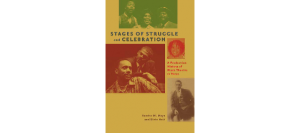
Greenwood: An American Dream Destroyed
by Celeste Bedford Walker
Theatre North
Tulsa Performing Arts Center, Liddy Doenges Theatre
Tulsa, Oklahoma
Directed by Willie Minor, Jr.
May 15, 2021
(Run of Show: May 8,9, 15,16)
Celeste Bedford Walker’s Historical Play
Greenwood: An American Dream Destroyed
Review by Sandra M. Mayo
Upon arriving in Tulsa, Oklahoma, I was treated to a tour of the Greenwood area, viewing the new homes that have gone up, the main street where thirty-six blocks were destroyed, the church the arsonists could not burn, the Black Wall Street mural, the infamous tracks where armed Black men waited for the White mob’s attack, and the open air park-like memorial with a beautiful waterfall, free standing columns with pictures of Greenwood residents, and an amazing architectural tower with etchings of the Greenwood community history and massacre. Then, in the light of a sunny day, amidst the appearance of prosperity and normalcy, on May 15, 2021, I stepped into the beautiful downtown Tulsa Fine Arts Center and was mesmerized and horrified by Theatre North’s thought provoking production of Celeste Bedford Walker’s Greenwood: An American Dream Destroyed. With vivid colors, sounds, and sparkling, bone chilling emotionally rending dialogue, the company embodied the days of infamy 100 years ago reimagining the wealth of the Black community and the horrific hate-fused racist assault.
Walker’s Greenwood, tightly woven in two acts, set in three days in 1921, is preceded by a prologue and bookended with an epilogue. Molly Boley (played by Sonya Wallace), wife of one the most successful Black entrepreneurs in town, established the context in the prologue as she recites the glorious history of the town before a women’s auxiliary meeting, then announces the visit of photographer, Lawrence Pritchard (played by Obum Ukabam) to document their success. Multimedia images and the soulful resonant sounds of Paul Robeson singing and a concert style performance of a trio of church choir members open the scene on a cheerful café style family restaurant and meat market where the audience meets the prosperous Boley family. With the audience aware of the bright beginning and deadly end, the playwright has primed the audience’s curiosity about how the destruction will be chronicled in her work.
Walker recounts the documented events of the tragedy from historical records with skillful development of the fictional characters, the Boley family and friends, a representative composite of the people caught up in the tragedy, who bring the story to light in its compelling emotional intensity. Sonya Wallace (as Molly) convincingly plays the bourgeois society lady with a touch of elitism in her voice and facial expressions. Elizabeth Bate (as Grandmother Boley), the matriarch, creates warmth, authority, and emotional intensity, happily glowing and scolding as the family gathers, and inquiring and despairing as things fall apart. Maurice Walker (as Frank) exudes the confidence of the successful businessman and respected father figure. Victor Muse (as Bill) adds warmth and fun with his female interest Della and intensity as a military veteran. Kia Hightower (Solene) brings a youthful energy and impetuousness to the role.
Greenwood’s supporting characters are developed with interesting personalities and back stories. Sharon Louie (as Della) vivaciously plays the flirty maid in a White home who brings tales of the family to the cafe. Ibraham Buyckes (as Jimmy Jones), a shoeshiner, is outgoing and intense in his relationship with the family and Solene, even though he has not achieved the Boley family level of education and economic success. Buyckes (as Jimmy), with passionate infectious determination, shares his entrepreneurial ambitions with Solene. Obum Ukabam (journalist and photographer Prichard) charismatically embodies an African griot (storyteller) narrating the action, while Brandon Jones (as Leviticus) inspires sympathy as the wealthy but jilted potato farmer and entrepreneur. Alexis Sayles (as Pegleg, construction worker and war veteran) adds folksy humor and grit when the battle looms large. Even minor characters as Rob Lee (as Dr. Jackson) and the café worker Kayla Fointno (as Maria Bonilla) come alive as they tell their personal stories and react to the shocking developments. As the audience comes to know these characters, both family and friends, its empathy and sympathy heighten to teary eyed exhaustion.
In the upscale black box Liddy Doenges Theatre in the sprawling Tulsa Fine Arts Center, the Greenwood technical designers, Daniel Williams, Neil Fisher, and Bear Hamilton, created a home away from home in the brightly colored, cheerful setting of the café where the major action takes place. Short scenes in exterior areas are suggested with lighting changes and suggestive props (as in a bench and streetlamp). The ambience complements the talk of Solene’s sojourn in Paris, Black soldiers’ glorious parades in Harlem after WW1, Black women involved in the women’s suffrage activities, and the good food Bill is preparing for the Memorial Day holiday festivities. Nonetheless, the happy talk in this cozy homey public environment is peppered with foreshadowing of trouble to come as they talk of the jealousy and greed of their White neighbors. As they gather, with little immediate concern other than where they should be placed in Pritchard’s photo, Walker effectively slashes the peace with the entrance of Jimmy rushing in with the shocking and terrifying news that he has been accused of attacking a White woman.
The playwright shapes a fast moving collage of narrative images of the atrocities visited upon the Black community as the atmosphere quickly shifts to anxiety and fear. The technical crew effectively implement flashing lights, gun fire, and explosions to create an atmosphere of the community under a relentless siege (as if in the midst of some major war). Horror is piled upon horror as the outsider journalist Pritchard and the Boley family and friends detail burning, bombing, theft, and murder in reactive monologues filled with fear and despair until silence reigns. Then, with the epilogue, the playwright caps the shocking denouement with a gathering of the dead and survivors for a final dirge. The quality of the storytelling keeps the audience on edge until the despicable end.
Led by producers, Board President Keith Jemison and Executive Director Maybelle Wallace, with the multitalented actor/director Willie Minor, Jr. and prolific playwright Celeste Bedford Walker, Theatre North gifted the Tulsa community with a commemoration of the Greenwood tragedy in the special way that art provides—re-discovering, re-imagining, and remembering.
Sandra M. Mayo, Ph.D. is a (retired) Administrator and Professor (emeritus) from the
Department of Theatre and Dance at Texas State University, San Marcos, TX.
****************
Karamu Theatre Live Stream Production
Greenwood: An American Dream Destroyed
Karamu Theatre in Cleveland Ohio created a video live stream of Walker’s Greenwood in 2021. It is available on their website. The link below will take you to the site to view it.
Greenwood: An American Dream Destroyed | Ideastream
BLOG RESPONSE REQUESTED (Respond to one or more of these questions or post any thoughts you have about the 1921 tragedy or the play.)
Greenwood: An American Dream Destroyed by Celeste Bedford Walker
• Have you previously heard about the Tulsa Massacre in 1921?
• What do you think of the historical drama based on the massacre as a way to memorialize the tragedy?
• What are your thoughts about Greenwood: An American Dream Destroyed after reading the review of the Tulsa Oklahoma production or viewing the live stream Karamu House Theatre production?

